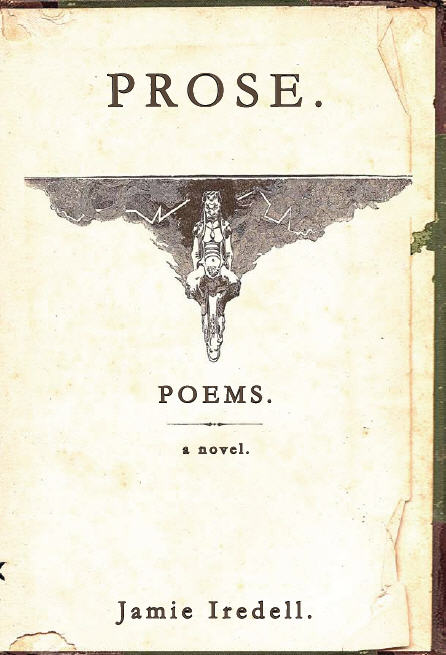Out today!

In his debut collection, Jamie Iredell calls on a classic and reemerging literary form to tell a story of travel, adventure, boredom, and life in general. Prose. Poem. A Novel. is a precisely written series of poems that when collected tell an addictive story. However, don’t expect to see complex titles and strict structure; this after all is a novel. Iredell masterfully pushes the reader through every detail, but as each page is turned form and genre melt quickly into a vital story.
Prose. Poems. A Novel., the third release from Orange Alert Press, is filled with brilliant and thematic illustrations from Christy Call (Literary Dispatch, Publishing Genius, and Willows Wept Press). These illustrations are in full color and add an even more vibrant visual element to Iredell’s story.
Here is my blurb on the book: “If Mary Robison listened to more punk, grew up in Las Vegas in the 80s before the 80s sucked, did whippits while reading Ben Marcus and scrolling the alternative personals for golden lines to crib, she might have exploded into the post-post-Beat sentence index that is Atlanta. But she didn’t. Jamie Iredell did, and in reading this lean but dense meat-eater of a sui generis prose poem cycle, one realizes there might still be a way for chapbooks to compete with porn.”
“What in the hell are these things? Stories? Poems? Stoems? Whatever they are, they have (lucky for us) catapulted from the brain, indeed the life, of this epicurean-poet-goonmaniac from Atlanta-via-Reno-via-northern-California. This book (much like the speaker himself) moves with a moody cat, and resolves amidst (and beyond) the sometimes seedy underbelly of Atlanta with its cavernous tavern dives, its ungodly cockroaches, its lust for excess. When you put down this book, you might suffer a hangover. But these pieces simultaneously achieve a sense of bildungsroman (think Joyce, not Sherwood Anderson). The consistency of voice and style here is remarkable, as is Iredell’s knack for creative metaphors (think Richard Brautigan). James Iredell has the skillz to pay the billz. Wait, he’s a poet so he can’t pay his billz. What I mean to say is, he has the skills to throw out the mail and keep scribbling, which is something he is always doing, and doing well.” – Mike Dockins, author of Slouching in the Path of a Comet
Great book from a great guy. Buy.
 In a recent comment thread about anonymous comments, one “Dan” (his quotes) says, of HTMLGIANT:
In a recent comment thread about anonymous comments, one “Dan” (his quotes) says, of HTMLGIANT:
 Blake already posted about &Now, but I want to put up more about one panel titled “Writing’s Dirty Secret: An Investigation of Literature’s Material Circumstances.” This panel was run by Jeremy Davies and AD Jameson and was really interesting because it tried to get at some of the more process-based questions about writing habits. How do we write? What do we use to write? Time of day? And so on. Standard questions really, but questions that might not get the focused treatment they deserve.
Blake already posted about &Now, but I want to put up more about one panel titled “Writing’s Dirty Secret: An Investigation of Literature’s Material Circumstances.” This panel was run by Jeremy Davies and AD Jameson and was really interesting because it tried to get at some of the more process-based questions about writing habits. How do we write? What do we use to write? Time of day? And so on. Standard questions really, but questions that might not get the focused treatment they deserve.
